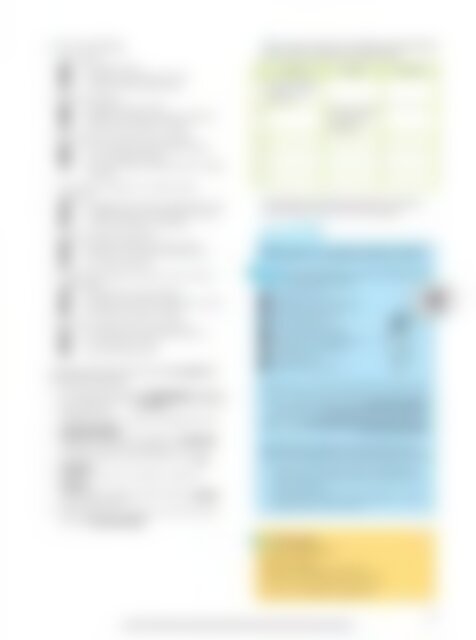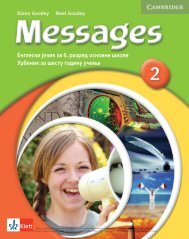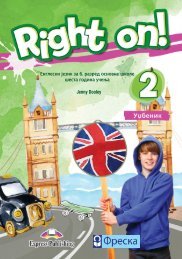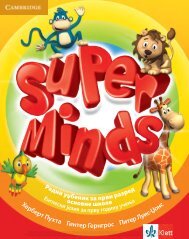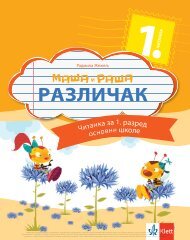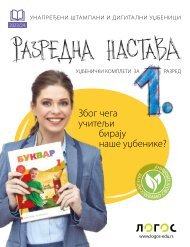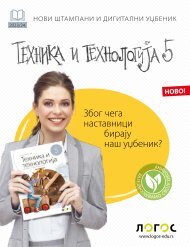Енглески језик, Way up 1 Intermediate 1, уџбеник и радна свеска за енглески језик у првом разреду гимназије, Klett
- No tags were found...
You also want an ePaper? Increase the reach of your titles
YUMPU automatically turns print PDFs into web optimized ePapers that Google loves.
B Tick the right answer.<br />
1 The author is<br />
a an Indian woman.<br />
b a British woman living in the UK.<br />
c a British woman living in India.<br />
2 The article is about<br />
a asking directions in India.<br />
b attitudes to politeness in Britain and India.<br />
c family values in Britain and India.<br />
3 The author advises Indians living in Britain<br />
a to be more direct when asking for things.<br />
b to avoid asking for things.<br />
c to use more indirect expressions when asking<br />
for things.<br />
4 The cartoon’s example of very indirect polite<br />
expressions<br />
a is exaggerated, but says something that is true.<br />
b is a good example of what happens in India.<br />
c is what always happens in Britain.<br />
5 To make a request in India, you<br />
a soften the request with indirect forms.<br />
b make sure you use please and thank you.<br />
c use a direct approach.<br />
6 When British people use indirect forms of request,<br />
Indians think<br />
a the British are being unfriendly.<br />
b the British really want something very much.<br />
c the British are being very polite.<br />
7 The article implies that forms of politeness<br />
a are necessary for social communication.<br />
b are connected to culture.<br />
c are not necessary at all.<br />
C Find the words in the article which mean the opposite of<br />
the underlined expressions.<br />
1 The author and her husband started out by getting lost.<br />
2 The rickshaw driver was very <strong>up</strong>set when her husband<br />
didn’t greet him.<br />
3 If Indians ask direct questions in England, they will<br />
make people happy.<br />
4 Requests for information in Britain are followed by<br />
complicated expressions of politeness.<br />
5 The cartoon shows a man who shouts ‘Help’ and<br />
is rescued.<br />
6 When the writer tries to be polite in India, this<br />
succeeds.<br />
7 When Indians ask blunt questions, they are denying<br />
that she’s their friend.<br />
8 If the writer behaves in Britain as she does in India,<br />
she could be very successful.<br />
D With a partner, add to the list of differences between Britain<br />
and India. Add a comparison with Serbian habits.<br />
In Britain In India In Serbia<br />
1 You greet a stranger<br />
before asking for<br />
directions.<br />
2 You don’t say please<br />
and thank you to<br />
your family.<br />
3<br />
4<br />
5<br />
E According to the information in the chart, are customs<br />
in Serbia closer to India or the UK? Give reasons.<br />
Get the hang of it!<br />
Making enquiries and requests by telephone in English<br />
3 A Listen to the beginnings of four short telephone calls.<br />
Tick the expressions you hear.<br />
May I speak with …?<br />
I wonder if you could tell me …<br />
Could you ask him to …?<br />
Can you tell me if …?<br />
I need some information.<br />
Could I get some information …?<br />
At what time is the film?<br />
I’d really like to …<br />
Could I ask you about …?<br />
B Write in your own words what the phone calls are about.<br />
Caller 1 wants information about<br />
and he’d like to .<br />
Caller 2 wants .<br />
Caller 3 wants to enquire about .<br />
C With a partner, role-play one of these telephone conversations.<br />
Then change partners and role-play another situation.<br />
1 Call a doctor’s surgery to make an appointment.<br />
2 Call the school to enquire about the date and time<br />
of the school play.<br />
3 Call an airline to find out about flights to London –<br />
available dates, times, and cost.<br />
G 13a Polite requests<br />
Can I stay in bed, please?<br />
May I get <strong>up</strong> later?<br />
Could I possibly borrow your pen?<br />
Would you mind lending me your iPod?<br />
MORE PRACTICE: Workbook, pages 84, 85<br />
Забрањено је репрод<strong>у</strong>ковање, <strong>у</strong>множавање, д<strong>и</strong>стр<strong>и</strong>б<strong>у</strong>ц<strong>и</strong>ја, објављ<strong>и</strong>вање, прерада <strong>и</strong> др<strong>у</strong>га <strong>у</strong>потреба овог а<strong>у</strong>торског дела <strong>и</strong>л<strong>и</strong> његов<strong>и</strong>х делова <strong>у</strong> б<strong>и</strong>ло ком об<strong>и</strong>м<strong>у</strong> <strong>и</strong> пост<strong>у</strong>пк<strong>у</strong>, <strong>у</strong>кљ<strong>у</strong>ч<strong>у</strong>ј<strong>у</strong>ћ<strong>и</strong><br />
фотокоп<strong>и</strong>рање, штампање, ч<strong>у</strong>вање <strong>у</strong> електронском обл<strong>и</strong>к<strong>у</strong>, односно ч<strong>и</strong>њење дела дост<strong>у</strong>пн<strong>и</strong>м јавност<strong>и</strong> ж<strong>и</strong>чн<strong>и</strong>м <strong>и</strong>л<strong>и</strong> беж<strong>и</strong>чн<strong>и</strong>м п<strong>у</strong>тем на нач<strong>и</strong>н кој<strong>и</strong> омог<strong>у</strong>ћ<strong>у</strong>је појед<strong>и</strong>нц<strong>у</strong> <strong>и</strong>нд<strong>и</strong>в<strong>и</strong>д<strong>у</strong>алн<strong>и</strong> пр<strong>и</strong>ст<strong>у</strong>п дел<strong>у</strong><br />
са места <strong>и</strong> <strong>у</strong> време које он одабере, без п<strong>и</strong>смене сагласност<strong>и</strong> <strong>и</strong>здавача. Свако неовлашћено кор<strong>и</strong>шћење овог а<strong>у</strong>торског дела представља кршење Закона о а<strong>у</strong>торском <strong>и</strong> сродн<strong>и</strong>м прав<strong>и</strong>ма.<br />
21


